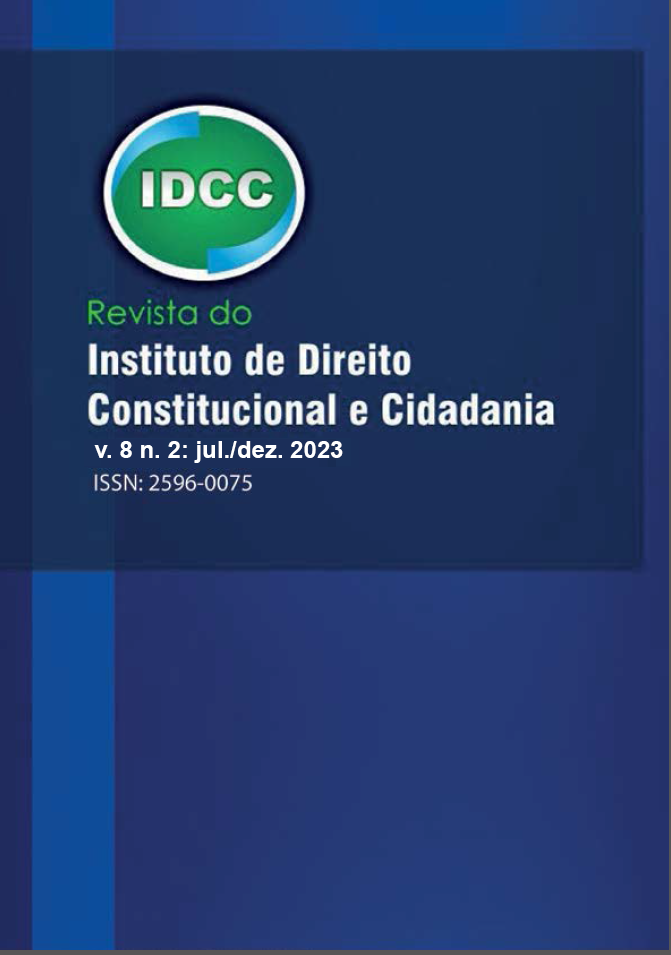The institutional torture practice from the perspective of critical thinking on human rights
reflections on a judicial decision
DOI:
https://doi.org/10.48159/revistadoidcc.v8n2.e096Keywords:
Human rights, critical thinking, institucional tortureAbstract
This work aims to understand the practice of torture in the Amapá prison system from the perspective of Herrera Flores' critical thinking. It explores the limits of the liberal model of Human Rights protection, focusing on the right of prisoners not to be tortured or subjected to cruel, inhuman and degrading punishments. Discusses the relationship between moral exclusion, institutional violence and structural racism, factors that are systematically reproduced in the prison environment. It analyzes the data resulting from a specific inspection at the Amapá prison institute, highlighting the conducts that violate human dignity carried out by certain prisional agents against prisoners in general and examining the response of the Amapá justice in the face of such facts. It concludes demonstrating that the hegemonic model of Human Rights protection is unable to avoid the culture of institutional violence in the prison system, such as it was observed at the prisional institute of Amapá/Brazil in 2022.
References
ALMEIDA, Silvio. O que é racismo estrutural? Belo Horizonte (MG): Letramento, 2018.
AMAPÁ. Tribunal de Justiça do Estado do Amapá. Vara de Execuções Penais. Pedido de Providências. Crimes de Tortura. Processo: 5000395-74.2022.8.03.0001. Juiz: João Matos Júnior. Decisão em 25/03/2022.
BENTO, Maria Aparecida Silva. Branqueamento e Branquitude no Brasil. In: Psicologia social do racismo – estudos sobre branquitude e branqueamento no Brasil / Iray Carone, Maria Aparecida Silva Bento (Organizadoras) Petrópolis, RJ: Vozes, 2002, p. (25-58)
BRASIL. Secretaria Nacional de Políticas Penais (SENAPPEN). Levantamento de Informações Penitenciárias. UF: Amapá, 13º Ciclo da Coleta, dez. 2022. Disponível em: https://www.gov.br/senappen/pt-br/servicos/sisdepen/relatorios/AP. Acesso em 08 set. 2023.
BRASIL, Mecanismo Nacional de Prevenção e Combate à Tortura. Relatório de inspeção no sistema prisional do Estado do Amapá no período de 14 a 18 de setembro de 2020. Disponível em: https://mnpctbrasil.files.wordpress.com/2021/04/relatorio-amapa_02_04_2021.pdf. Acesso em: 07/06/2022.
DUARTE, Evandro Charles Piza. Criminologia e Racismo: introdução à criminologia brasileria. Curitiba: Juruá, 2022.
GALLARDO, H. Direitos Humanos como movimento social. Para uma compreensão popular da luta por direitos humanos. Rio de Janeiro, Faculdade Nacional de Direito, 2019. Páginas: 21-34; 69-114; 144-156.
GÁNDARA, Manuel. Derechos humanos y capitalismo: reflexiones en perspectiva socio-histórica. En: Revista de Derechos Humanos y Estudios Sociales. N° 10, Julio-Diciembre 2013.
HERRERA FLORES, J. A (re)invenção dos direitos humanos. Tradução de Carlos Roberto Diogo Garcia, Antônio Henrique Graciano Suxberger e Jefferson Aparecido Dias. Florianópolis: Fundação Boiteux, 2009.
PACHECO, John. Juiz cita 'terror psicológico' e 'tortura' para afastar policiais e interditar pavilhão do Iapen. G1 Amapá, 2022. Disponível em: https://g1.globo.com/ap/amapa/noticia/2022/03/26/juiz-cita-terror-psicologico-e-tortura-para-afastar-policiais-e-interditar-pavilhao-do-iapen.ghtml. Acesso em: 10 set. 2023.
Downloads
Published
How to Cite
Issue
Section
License
Copyright (c) 2024 Newton Cruz, Antonio Sepulveda, Igor de Lazari

This work is licensed under a Creative Commons Attribution 4.0 International License.
Você tem o direito de:
Compartilhar — copiar e redistribuir o material em qualquer suporte ou formato
Adaptar — remixar, transformar, e criar a partir do material para qualquer fim, mesmo que comercial.
O licenciante não pode revogar estes direitos desde que você respeite os termos da licença.
De acordo com os termos seguintes:
Atribuição — Você deve dar o crédito apropriado, prover um link para a licença e indicar se mudanças foram feitas. Você deve fazê-lo em qualquer circunstância razoável, mas de nenhuma maneira que sugira que o licenciante apoia você ou o seu uso.
Sem restrições adicionais — Você não pode aplicar termos jurídicos ou medidas de caráter tecnológico que restrinjam legalmente outros de fazerem algo que a licença permita.

